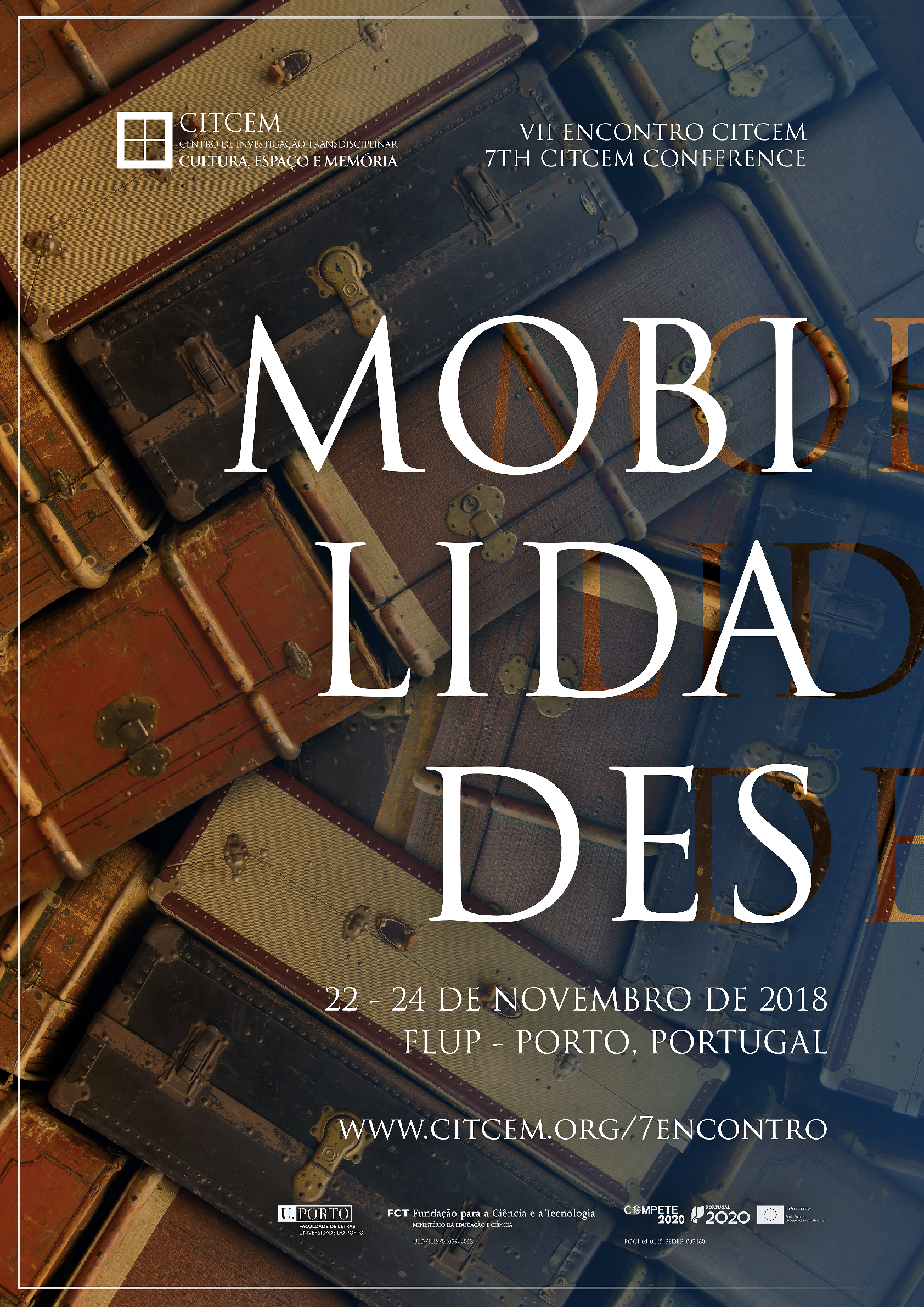Events

Local:
Start Date:
End Date:
Hours:
Organization:
Investigation Group
Event type:
VII CITCEM Meeting: Mobilities
The concept of mobility has never been so present, both in informal and media discourse and in scientific discourse. Migration flows caused by political-religious conflicts, the plight of refugees or labor flows triggered by the attraction of the world’s major technological and economic centers are recurrently addressed in the pages of newspapers and in everyday conversations. In line with this social centrality of the issue, also at the academic level this theme has been chosen as central to research projects, whether mono or multidisciplinary. We need to continue along this path, opening up perspectives that are both innovative and integrative.
Until a few decades ago, the debate on Mobilities was concentrated, from the point of view of academic studies, on questions of the physical displacement of people, goods and services on a national or international scale, or, on more regional scales, centered on transfers from the rural to the urban world. In more recent times, this debate has benefited from a new focus of analysis that takes mobility as “a process that is firmly fixed within society and culture (…) and therefore fundamental to the construction and reproduction of key social structures” (POOLEY, 2017: 5-7).
The reinvention of the term Mobilities has been reflected in the broadening of concepts that reveals how it has managed to keep up with the evolution of the times, becoming fundamental for understanding the transformations in human societies. In this way, a “new paradigm of mobilities” is being built that favors “integrated approaches” (CRESSWELL, 2012: 651). These approaches incorporate new spatial and temporal scales of migration and take physical and virtual distances as elements of analysis that go from a micro to a macro scale. Also the accessibility and motorization of transport and its environmental impacts, or day-to-day mobility and in times of lazersion, are topics that have been dealt with in an integrated way. All this has led to new understandings of what centers and peripheries are and their mutual relationships.
Migration, perhaps the most recurrent aspect of Mobility studies, can be interpreted in a linear way – by looking at only one part of the process (such as the points of departure and arrival, for example) – or through longitudinal perspectives that approach the dynamic experience of mobility. The motivations behind a demographic phenomenon, such as fleeing a certain place or looking for resources in another, the reactions to the arrival of new individuals and their inclusion or exclusion, social, political, economic and cultural segregation are many other points that need to be studied, converging with the issue of cultural transfers. The topic of exile and the exiled thus also emerges as pertinent in these discussions.
The broad concept of Mobilities, central to the VII CITCEM Meeting, does not exclude social mobility, individual and collective journeys within societies, made possible by the constraints of the labor market, family or interpersonal relationships (CLARK, 2014: 1-16). However, mobility is not only human. These are also artistic, according to Aby Warburg’s concept, as they focus on the migrations of forms and images. And they can be ecological, linked to transfers of plants, animals and diseases, in other words, linked to the biological mobility that human action has accelerated and placed on a global scale.
CITCEM’s 7th International Meeting is sensitive to all these dimensions and proposes to address the theme of Mobilities through transdisciplinary perspectives, combining various areas of knowledge: from those most closely linked to the disciplinary components of the Research Center – Archaeology, History, Demography and History of Populations, Information and Communication Sciences, Politics and International Relations, Geography, Literary, Linguistic, Cultural, Artistic or Cinematographic Studies, to contributions from other fields, with which it must dialogue, such as Philosophy or Life and Health Sciences.
With Mobilities as its central theme, the 7th CITCEM Meeting invites the national and international scientific community, in particular young researchers, to submit proposals for papers (individual or panel), posters and sessions on R&D projects, within the framework, although not exclusively, of seven thematic axes:
- Migration
- Cultural and artistic transfers
- Technical and scientific transfers
- Ecological transfers
- Social Mobility
- Exile and Asylum
- Routines and contacts
This call for papers bears witness to a multi- and trans-disciplinary openness, which cannot be unrelated to the societal challenges of the present and future of a global world in which, as a scientific community and as citizens, we find ourselves, and to whose debate we are all called to contribute.
Scientific Committee:
– Amélia Polónia (CITCEM/FLUP)
– Ana Cristina Sousa (CITCEM/ FLUP)
– Ana Sílvia Scott (IFCH – State University of Campinas)
– Dejanirah Couto (École Pratique des Hautes Études)
– Diego Ramiro Fariñas (CCHS)
– Dulce Freire (ICS – University of Lisbon)
– Francisco Topa (CITCEM/FLUP)
– Gaspar Martins Pereira (CITCEM/FLUP)
– Joana Fonseca Antunes (FLUC)
– Jorge Fernandes Alves (CITCEM/FLUP)
– Luís Alberto Marques Alves (CITCEM/FLUP)
– Norberta Amorim (CITCEM)
– Ofelia Rey Castelao (USC – University of Santiago de Compostela)
– Teresa Soeiro (CITCEM/FLUP)
Organizing Committee
– João Antero Ferreira (CITCEM/ FLUP
– Jorge Fernandes Alves (CITCEM/ FLUP)
– Norberta Amorim (CITCEM/ FLUP)
Secretariat:
– Vanessa Sousa
– Vasco Sistelo
